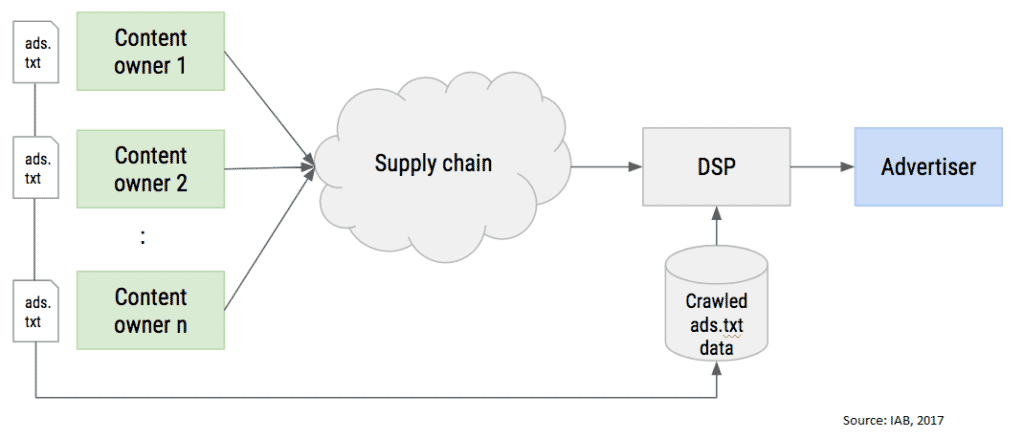WHAT IS ADS.TXT? Ads.txt is an industry initiative driven by the IAB (Interactive Advertising Bureau) with a simple purpose: increase transparency in the programmatic advertising ecosystem. Ads.txt stands for Authorised Digital Sellers and is a simple yet effective...
WHAT IS ADS.TXT?
Ads.txt is an industry initiative driven by the IAB (Interactive Advertising Bureau) with a simple purpose: increase transparency in the programmatic advertising ecosystem. Ads.txt stands for Authorised Digital Sellers and is a simple yet effective concept for publishers and distributors to adopt, enabling them to publicly declare the exchanges/organisations they authorise to sell their digital inventory.
By creating a public record of Authorised Digital Sellers, ads.txt will create greater transparency in the inventory supply chain and give publishers control over their inventory in the market, making it harder for resellers or counterfeit inventory sources across the ecosystem. As publishers adopt ads.txt, our programmatic team will be able to more easily identify the Authorised Digital Sellers for a participating publisher, allowing brands to have confidence that they are buying authentic publisher inventory.
WHAT IS THE USE CASE FOR ADS.TXT?
The ads.txt project aims to prevent various types of counterfeit inventory across the ecosystem by improving transparency in the digital programmatic supply chain. When a brand advertiser buys media programmatically, they rely on the fact that the URLs they purchase were legitimately sold by those publishers. There are 2 main types of inventory ads.txt will help the industry address:
- Mislabeled inventory: sellers intentionally masking inventory to evade inventory exclusion lists and drive up CPMs on the pretence of being premium
- Inventory resellers: sellers that are buying inventory in the open auction, and reselling into market at an inflated rate
Identifying these resellers at scale will be the first step in removing fraudulent operators from the digital ecosystem.
HOW DOES ADS.TXT WORK?
Ads.txt works by creating a publicly accessible record of authorised digital sellers for publisher inventory that programmatic buyers can index and reference if they wish to purchase inventory from authorised sellers. First, participating publishers must post their list of authorised sellers to their domain. Programmatic buyers can then crawl the web for publisher ads.txt files to create a list of authorised sellers for each participating publisher. Then programmatic buyers can create a filter to match their ads.txt list against the data provided in the OpenRTB bid request.
A programmatic buyer receiving a bid request claiming to be example.com can verify if the exchange and SellerAccountID matches the authorised sellers listed in the example.com/ads.txt file.
Our POV
We fully support the adoption of ads.txt initiative and it will become part of our digital transparency and accountability standards moving into 2018. Any scalable solution that allows us to determine poor inventory sources in the open exchange will only benefit our brands and further highlight our premium supply, and concentration on quality inventory.
As part of Omnicom Media Group (OMG) we are already working closely with our buying partners to identify actionable measures we can take using ads.txt. The initial roll-out will allow for identifying poor quality sellers and networks which we can block from our supply. We will be pushing our DSP partners for a solution where we can identify the backlisted sellers or non-approved sellers in the bid request, and not bid on this inventory.
We will work closely with our specialist trading team OMG Programmatic to build out capabilities within the URL analyser tool so we can determine if networks are buying across fraudulent or reseller inventory and not directly from publishers.
OMG Programmatic puts a lot of time and effort into keeping current across publisher technology stacks and executing across PMPs (private marketplaces) for prioritised access and use of second-party data. This alleviates the need for ads.txt as the relationship through a PMP is 1-to-1 with the publisher. Longer term we see the majority of programmatic inventory sitting within non-reserved PMPs.
Along with ads.txt, OMG is focusing on supply-side platform (SSP) transparency guidelines for 2018. This will ensure our brands are confident that not only are we only buying from approved sellers, but we’re also able to show transparency in any associated technology costs passed onto buyer or seller. Supply chain transparency will be key in combatting negative stigma around programmatic trading.
Ads.txt will not replace our current brand safety and fraud detection measures.
Although there has been aggressive calls for publishers to roll-out ASAP, scalable adoption of ads.txt will likely happen in Q1 2018.










